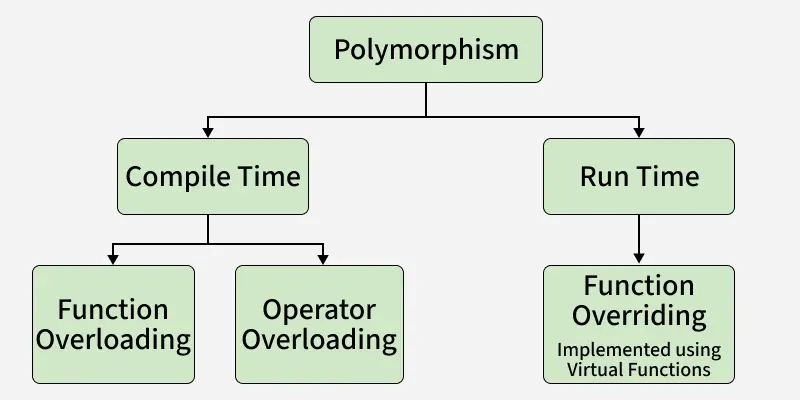The word polymorphism means having many forms. In C++, polymorphism concept can be applied to functions and operators. A single function name can work differently in different situations. Similarly, an operator works different when used in different context.
 Types of Polymorphism
Types of Polymorphism1. Compile-Time Polymorphism
Also known as early binding and static polymorphism, in compile-time polymorphism, the compiler determines how the function or operator will work depending on the context. This type of polymorphism is achieved by function overloading or operator overloading.
A. Function Overloading
Function overloading is a feature of object-oriented programming where two or more functions can have the same name but behave differently for different parameters. Such functions are said to be overloaded; hence, this is known as Function Overloading. Functions can be overloaded either by changing the number of arguments or changing the type of arguments.
C++ #include <bits/stdc++.h> using namespace std; class Geeks { public: // Function to add two integers void add(int a, int b) { cout << "Integer Sum = " << a + b << endl; } // Function to add two floating point values void add(double a, double b) { cout << "Float Sum = " << a + b << endl ; } }; int main() { Geeks gfg; // add() called with int values gfg.add(10, 2); // add() called with double value gfg.add(5.3, 6.2); return 0; } OutputInteger Sum = 12 Float Sum = 11.5
Explanation: In the above example, two add() functions are defined with the same name but different parameter types: one for integers and one for floating-point numbers. The correct version of the add() function is called at compile time based on the type of arguments passed, allowing the same function name to be used for different data types.
B. Operator Overloading
C++ has the ability to provide the operators with a special meaning for particular data type, this ability is known as operator overloading. For example, we can make use of the addition operator (+) for string to concatenate two strings and for integer to add two integers. The << and >> operator are binary shift operators but are also used with input and output streams. This is possible due to operator overloading.
CPP #include <iostream> using namespace std; class Complex { public: int real, imag; Complex(int r, int i) : real(r), imag(i) {} // Overloading the '+' operator Complex operator+(const Complex& obj) { return Complex(real + obj.real, imag + obj.imag); } }; int main() { Complex c1(10, 5), c2(2, 4); // Adding c1 and c2 using + operator Complex c3 = c1 + c2; cout << c3.real << " + i" << c3.imag; return 0; } Generally, operators like +, -, etc. does not work for user defined classes as they don't know what to do with them. Operator overloading allows us to define the behaviour of such operators for user defined data types like we did in this program with Complex class.
In C++, most operators can be overloaded to work with user-defined types. However, a few operators like ::, ., .*, ?:, and sizeof cannot be overloaded because they are fundamental to the language's core behavior. These restrictions preserve clarity and compiler integrity.
2. Runtime Polymorphism
Also known as late binding and dynamic polymorphism, the function call in runtime polymorphism is resolved at runtime in contrast with compile time polymorphism, where the compiler determines which function call to bind at compilation. Runtime polymorphism is implemented using function overriding with virtual functions.
Function Overriding
Function Overriding occurs when a derived class defines one or more member functions of the base class. That base function is said to be overridden. The base class function must be declared as virtual function for runtime polymorphism to happen.
C++ #include <bits/stdc++.h> using namespace std; class Base { public: // Virtual function virtual void display() { cout << "Base class function"; } }; class Derived : public Base { public: // Overriding the base class function void display() override { cout << "Derived class function"; } }; int main() { // Creating a pointer of type Base Base* basePtr; // Creating an object of Derived class Derived derivedObj; // Pointing base class pointer to // derived class object basePtr = &derivedObj; // Calling the display function // using base class pointer basePtr->display(); return 0; } OutputDerived class function
Explanation: In the above example, a virtual function display() is defined in the base class Base, and it is overridden in the derived class Derived. The Base class pointer basePtr points to an object of the Derived class. When the display() function is called using the basePtr, the derived class version of the display() function is called, and prints "Derived class function." This is possible because call is resolved at the runtime.
Runtime vs Compiler Time Polymorphism
The major difference between the compile-time and runtime polymorphism is:
Compile Time Polymorphism | Run time Polymorphism |
|---|
Also called static binding | Also called dynamic binding |
Achieved using function overloading and operator overloading | Achieved using virtual functions and function overriding |
Decision made by the compiler at compile time | Decision made at runtime using vtables |
Faster due to early binding | More flexible but slightly slower |
Explore
C++ Basics
Core Concepts
OOP in C++
Standard Template Library(STL)
Practice & Problems
My Profile